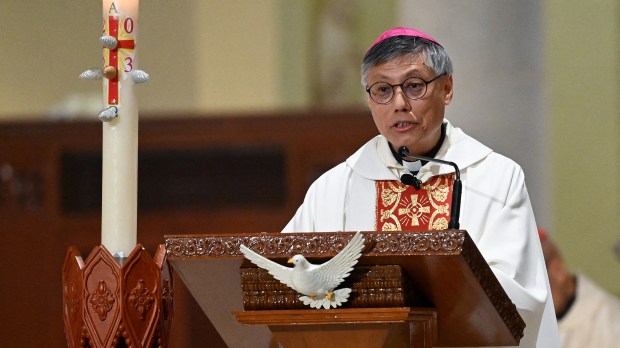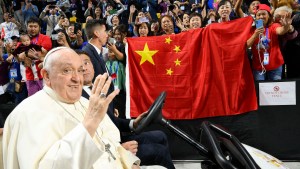On September 30, 2023, Bishop Stephen Chow will become the fourth cardinal in the history of Hong Kong, a diocese that historically has been strategic in the relationship between the Catholic Church and China.
Background and formation
Stephen Chow Sau-yan was born on August 7, 1959, into a Catholic family in Hong Kong. He attended Dominican and then Jesuit schools, where his vocation to the priesthood and his interest in education were born. After studying in the United States, he went to Ireland where, in 1984, he decided to join the Society of Jesus.
Returning to Hong Kong in 1988, he began a career in teaching and administration of Jesuit schools. Chow spent two years in Chicago where he completed a master’s degree in institutional development at Loyola University. He received priestly ordination in 1994 and continued his mission in the field of education. He even went on to earn a doctorate in human development from Harvard in 2006.
In 2018, Fr. Chow was elected head of the Chinese province of the Society of Jesus. This covers Hong Kong, Taiwan, Macau, and mainland China, so he traveled extensively. He also became a member of the Beijing Center, a Jesuit organization that promotes dialogue and friendship between China and other cultures. It takes its inspiration from the great 16th-century Jesuit missionary Fr. Matteo Ricci.
A politically sensitive bishopric
When Bishop Michael Yeung, who had been the bishop of Hong Kong since 2017, died in 2019, the question of his replacement proved complex for the Vatican. Rome and Beijing had just signed the pastoral agreement on the appointment of bishops in 2018. The agreement provides for the Chinese government to have a say in appointments on its territory, of which Hong Kong is a part.
The Diocese of Hong Kong still boasts two important bishops emeritus: Cardinals Joseph Zen and John Tong Hon. The former, in particular, is a high-profile opponent of the Chinese Communist Party. He denounces the persecution of Chinese Catholics and is an outspoken supporter of the pro-democracy movement fighting Beijing’s progressive grip on the Hong Kong enclave.
When Cardinal Zen was nearing retirement, the Vatican had considered appointing auxiliary bishop Joseph Ha Chi-shing as his replacement. However, his participation in pro-democracy protests in 2019 made his appointment too complicated. In December 2020, Pope Francis then asked Fr. Stephen Chow to become the ninth bishop of Hong Kong.
Bishop out of obedience
The Jesuit initially refused, not feeling cut out for the task. But at the Pontiff’s insistence, he finally accepted “out of obedience” in May 2021. He only asked that his episcopal consecration be postponed until the end of the year, December 4, 2021, to allow him to put his affairs in order.
Archbishop Chow is a strategic choice. As a Jesuit, he benefits from the aura of Venerable Matteo Ricci, who is highly respected in China. Ricci laid the groundwork for a long tradition of respectful dialogue between the Society of Jesus and China, which importantly has given the order access to Chinese universities.
What’s more, unlike Cardinal Zen, who was deeply affected by the persecution suffered by his family under Mao, Bishop Chow belongs to a new generation of Hong Kongers who wish to renew their ties with mainland China. He is therefore very much in favor of the Holy See’s policy of openness.
“We are a bridge between China — mainland China — and the universal Church,” he tells I.Media. But while he works with the Secretariat of State and Cardinal Pietro Parolin on Chinese issues, he insists that he doesn’t work “for them.”
Hong Kong, a bridge diocese
Indeed, for him the “personal” closeness he is responsible for creating with Catholics and non-Catholics in China is at least as important as the “official” relationship that Rome is working on. The latter, he cautiously admits, “doesn’t allow for very good communication” at the moment.
In order to initiate a new path of discussion with China, he made an unprecedented pastoral trip to Beijing this year. While there, he was able to exchange views with the Chinese capital’s Catholic community and authorities.
More generally, the bishop of Hong Kong avoids any confrontation with the authorities, although this does not prevent him from challenging them. In 2023, he notably pleaded for a lenient attitude towards those imprisoned since the 2019 protests. He called on the government to set limits to the Security Act, which since 2019 has restricted individual freedoms in Hong Kong in the name of the fight against foreign influences.
He is also counting on conciliation and rapprochement to enable the many missionaries present in his diocese to continue to play their role, particularly in mainland China.
Although he expressed surprise at the announcement of his cardinalate, he attributes the Pope’s decision to the importance of his diocese, and sees it as an encouragement for Hong Kong to help strengthen the relationship between China and the rest of the world.


